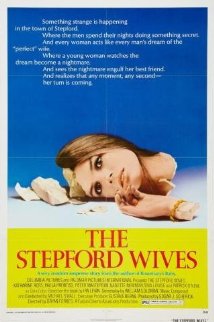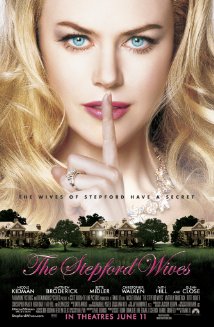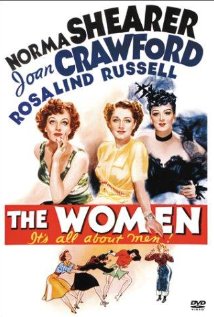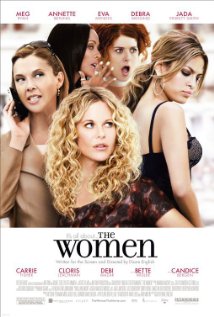The 2004 remake of the 1975 film The Stepford Wives did not enjoy a welcoming reception. Plagued by production problems, panned by critics, ignored by audiences, it was widely regarded as a disaster. It was one of those cases of a movie where it seems that the filmmakers merely ruined - or even disrespected - a classic that should have stood on its own.
It was certainly a much different version of the story, and a much different film. The original, based on a novel by Ira Levin, is dark and menacing. A sense of quiet foreboding pervades as the young wife at the center of the story slowly discovers her circumstances and her likely fate. She is in a world which is serene and pleasant on the surface, but deeply and dangerously evil underneath.
The remake is kind of a campy comedy. It pokes fun at the idea behind the story. The husbands seeking to utterly objectify their wives seem more foolish than evil. The young wife is on an adventure, with the implied assurance that comes with adventure stories that the protagaonist will prevail. And a plot twist at the end makes for clever psychosocial commentary.
Really, the remake is an update to the story for a new social era. Seen in this way, it is not so much a wreck of a classic movie, as a reflection of the changes to our society over a period of two generations.
The original is an artifact of the Silent generation, the young generation of the 1950s and early 1960s. Their social milieu was bland and conventional, to the point of being stifling. The women of that generation yearned to break out of what were perceived to be the traditional roles of a woman as housewife and helpmate. The 1975 version of Stepford Wives can easily be seen as an allegory about women trapped by the demand to be perfectly fitted to those roles, while their insensitive husbands enjoy a freer life.
Thirty years later, a story about a woman stuck in the conventional life of a housewife just makes no sense. Too much has changed over the years. The humdrum Middle America of yesteryear seems amusing, hardly menacing. So the creators, who are from the Boomer generation, whose youthful unrest smashed that conventional world, give us a playful tale - inviting us to laugh at characters who try to live up to old-fashioned expectations.
Their young wife is a Gen-Xer, spunky and resourceful, hardly a victim for boorish men to take advantage of. She easily navigates the threats of this new version of Stepford, and exposes the conspiracy. In the end, we learn that by objectifying women, men objectify themselves. But in a social order no longer limited by traditional gender roles, men and women have the opportunity to better each others' lives as equal partners.
Another remake of a classic which is perhaps a bit truer to the original is the 2008 version of The Women. No allegorical work of speculative fiction, this story takes a hard-headed look at the realities of life for women in a man's world. The main character is a woman whose marriage is threatened by an affair between her husband and another woman playing the home wrecker. She is assisted in her struggle with this situation by the worldly advice of her mother.
What separates the two versions of the film is the sense of what is expected of the main character in her role as wife and mother. In the 1939 story, the wise advice is for her to sacrifice her personal pride for the sake of her family. But in 2008, she has much more freedom to choose a path which leads to both personal satisfaction and success in relationships.
Again, the difference can be explained by looking at the generations and the social eras to which each woman belongs. The 1930s woman is a member of the GI (Greatest) Generation, at a time of rising demand for social order and stability, and her mother suggests that she put her own needs aside for the welfare of her child. The 2000s woman is a Gen-Xer, in the waning years of an era of personal freedom, and is encouraged to take advantage of the expanded choices she enjoys in a society which still exalts the individual. Each woman must face the opportunities and limitations particular to her generation's experience in history.
In the past century and more of the existence of the film medium, many stories have been told and then retold over the generations. The most popular ones have too many film versions to count. In each retelling, the values and beliefs of a new generation of filmmakers come to light. When watching a remake of a popular classic, one might appreciate it best not by comparing it to the original version, but by considering how it reflects the unique perspective of the people of its time.
 |
|
Year: 1975 Director: Bryan Forbes (Silent Generation, born 1926) Writers: Ira Levin (novel) (Silent Generation, born 1929), William Goldman (screenplay) (Silent Generation, born 1931) Starring: Katharine Ross (Silent Generation, born 1940) |
 |
|
Year: 2004 Director: Frank Oz (Boomer Generation, born 1944) Writer: Paul Rudnick (screenplay) (Boomer Generation, born 1957) Starring: Nicole Kidman (Generation X, born 1967) |
 |
|
Year: 1939 Director: George Cukor (Lost Generation, born 1899) Writer: Clare Boothe Luce (play) (GI Generation, born 1903) Starring: Norma Shearer (GI Generation, born 1902), Lucile Watson (Missionary Generation, born 1879), |
 |
|
Year: 2008 Director: Diane English (Boomer Generation, born 1948) Starring: Meg Ryan (Generation X, born 1961), Candice Bergen (Boomer Generation, born 1946), |